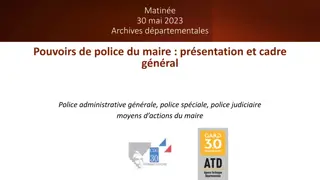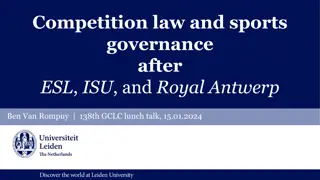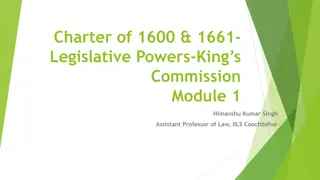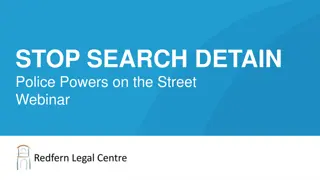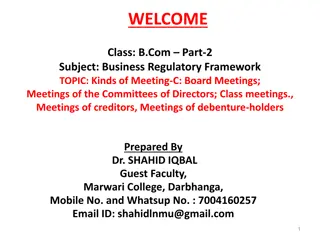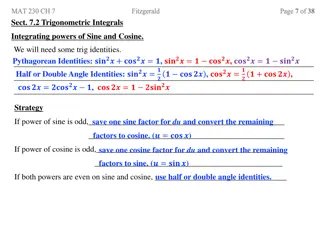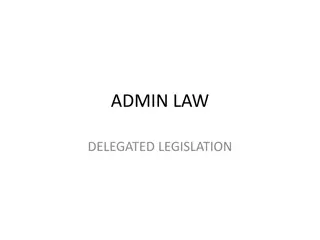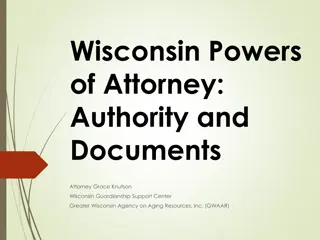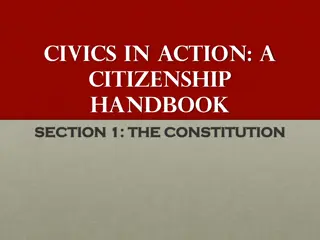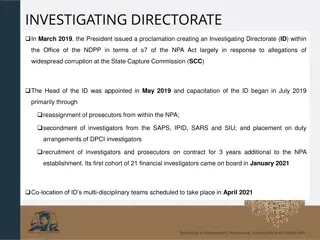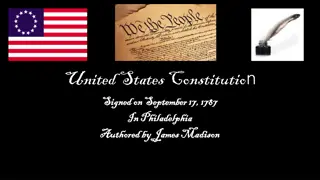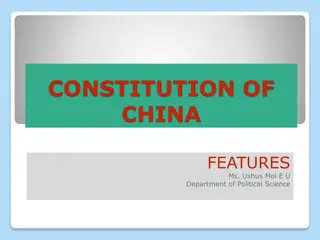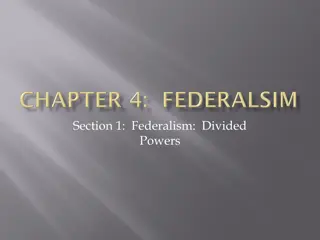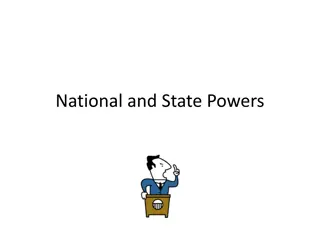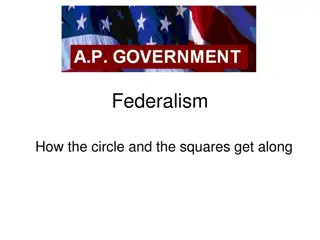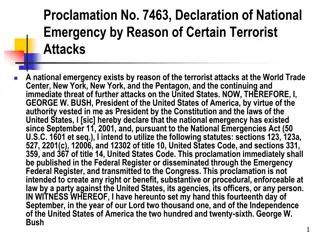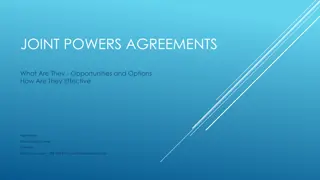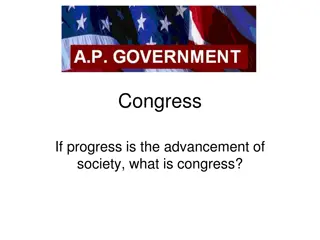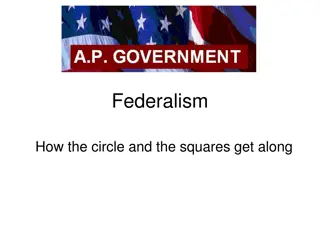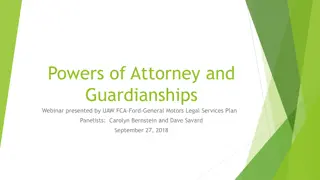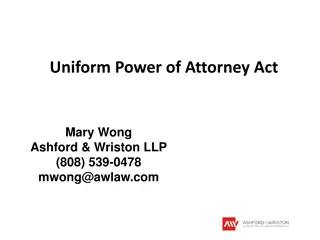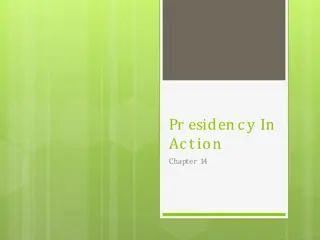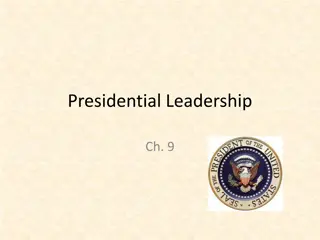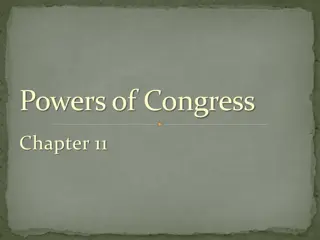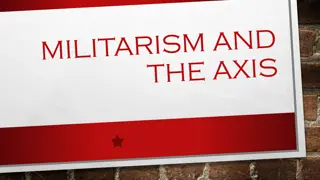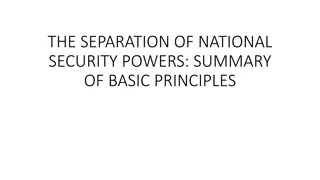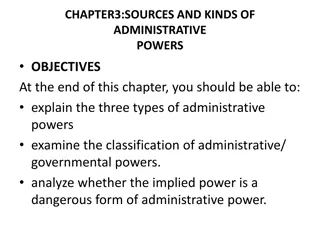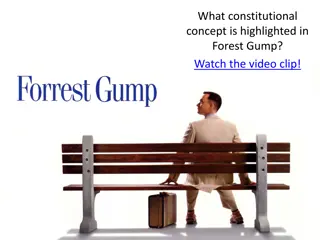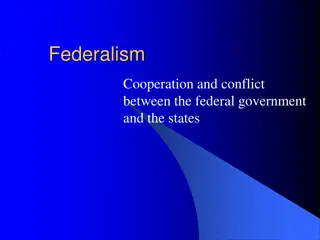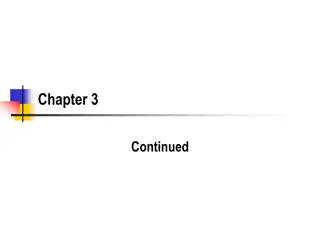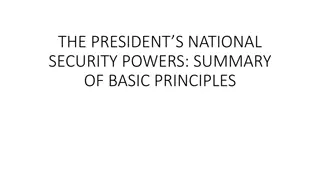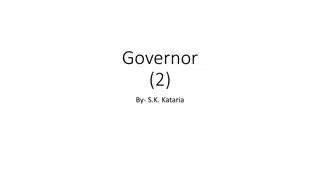Emergence and Expansion of Powers Before the Guptas
Explore the political landscape of ancient India before the rise of the Guptas, including minor powers and rulers like Kushanas, Nagas, Vakatakas, Ikshvakus, and more. Learn about the varied kingdoms and emerging territories shaping the region's history.
6 views • 25 slides
READ⚡[PDF]✔ Emerging Space Powers: The New Space Programs of Asia, the Middle Ea
\"COPY LINK HERE ; https:\/\/getpdf.readbooks.link\/B004NNUV54\n\n[READ DOWNLOAD] Emerging Space Powers: The New Space Programs of Asia, the Middle East and South-America (Springer Praxis Books) | Emerging Space Powers: The New Space Programs of Asia, the Middle East and South-America (Springer Pra
1 views • 6 slides
Understanding Separation of Powers in Constitutional Law
Explore the concept of separation of powers in constitutional law, as depicted through the lens of the Diploma in Law program from Malta. Learn about the principles of checks and balances, the relationship between the Executive and the Legislature, and the significance of the rule of law in a democr
0 views • 10 slides
Understanding the Powers of the Mayor in Police Matters
Explore the different facets of the mayor's police powers, including general administrative police, special police, and judicial police. Learn about the preventive and punitive roles of police, focusing on water supply and urban planning regulations. Delve into definitions and distinctions between a
2 views • 42 slides
Enhancing Law Enforcement with LEAP Programme in Cape Town
The Law Enforcement Advancement Programme (LEAP) aims to stabilize crime hotspots in Cape Town and ensure residents' safety. LEAP grants powers such as warrantless arrests, article seizures, and demanding identification. Municipal law enforcement officers have limited powers regarding specific offen
3 views • 35 slides
Competition Law and Sports Governance: Analysis of ESL, ISU, and Royal Antwerp Cases
This presentation delves into the intersection of competition law and sports governance, focusing on landmark cases such as ESL, ISU, and Royal Antwerp. It explores the positioning of sports governing bodies, the legitimacy of their authority, gatekeeping powers, and the specific challenges faced in
1 views • 24 slides
Establishment of East India Company: Historical Overview and Legislative Powers
British rule in India started with the trading of spices by European nations in the 15th century. The English East India Company was granted exclusive trading rights in Africa, Asia, and America, eventually becoming a political force. Queen Elizabeth I granted a charter in 1600, giving the Company l
0 views • 5 slides
Understanding Police Powers on the Street Webinar
Explore the powers and procedures of police officers on the street in this informative webinar featuring Sophie Leaver, a Police and Administrative Law Solicitor from Redfern Legal Centre. Topics covered include where police derive their powers, identity requests, personal searches, complaints proce
4 views • 44 slides
Understanding Different Types of Business Meetings in Corporate Governance
Directors of a company hold board meetings to exercise powers and functions efficiently. These meetings ensure effective supervision of the company. Board meeting procedures, quorum requirements, and delegation of powers to committees of directors are discussed. Class meetings for specific sharehold
0 views • 8 slides
Trigonometric Integrals: Strategies and Identities
Learn useful trigonometric identities and strategies for integrating powers of sine and cosine. Understand when to use Pythagorean, Half or Double Angle Identities, and how to handle odd or even powers efficiently. Examples provided for clarity.
1 views • 14 slides
Understanding Delegated Legislation in Admin Law
Explore the significance of delegated legislation in government affairs, its interrelation with separation of powers, and the delegation of legislative, executive, and judicial powers. Learn about the definition, validity, hierarchy, and importance of delegated legislation through real-world example
0 views • 12 slides
Understanding Wisconsin Powers of Attorney: Core Concepts and Types
Explore the essential concepts of powers of attorney in Wisconsin, including self-determination, legal documentation, next of kin laws, and types such as health care and finance powers. Learn about the authority granted to agents and the implications of durable power of attorney.
0 views • 51 slides
Understanding the Foundation of US Government: The Constitution and its Principles
The Constitution of the United States outlines key principles governing the government, including popular sovereignty, republicanism, limited government, federalism, separation of powers, checks and balances, and individual rights. It establishes six goals for the US government and delineates the po
2 views • 12 slides
Overview of Investigating Directorate Establishment and Functions
In March 2019, the President established the Investigating Directorate (ID) within the National Prosecuting Authority (NPA) to address corruption allegations. The ID has powers to subpoena witnesses, execute search warrants, compel testimony under oath, and prosecute cases. Through partnerships, the
1 views • 19 slides
Understanding the United States Constitution and Federalism
Delve into the history and significance of the United States Constitution, authored by James Madison in 1787. Explore the debate of ratification, Federalist vs. Anti-Federalist arguments, and the concept of Federalism, with a focus on the balance of powers between the central and state governments.
1 views • 23 slides
Features of China's 1982 Constitution
The 1982 Constitution of China, drafted after extensive discussions, adheres to socialist principles and emphasizes the socialist system as the foundation of the state. With a total of 138 Articles, it is a flexible document allowing for easy amendments and maintains a unitary system with centralize
2 views • 13 slides
Understanding Federalism: Divided Powers and Constitutional Framework
Federalism is a system where powers are divided between a central government and regional entities. It involves delegated, reserved, exclusive, and concurrent powers outlined in the Constitution. The supremacy of the Constitution is pivotal in establishing a unified federal government.
0 views • 5 slides
Understanding National and State Powers in the United States
The Constitution grants specific powers to the national government, including expressed, implied, and inherent powers. States have reserved powers, and there are concurrent powers shared by both levels of government. The Supremacy Clause ensures that national laws take precedence over state laws. Ex
0 views • 13 slides
Understanding Federalism in the United States
Federalism in the United States involves the relationship between the federal government and state governments, with terms such as delegated powers, reserved powers, concurrent powers, and the Elastic Clause playing key roles. The aftermath of events like Hurricane Katrina and policies such as No Ch
0 views • 30 slides
Understanding National Emergency Declarations and Emergency Powers Laws
This content delves into the legal aspects of national emergency declarations, emergency powers laws, and judicial review of emergency declarations. It covers the purpose, termination, historical context, congressional oversight, and impact on presidential powers. It also explores the complexities o
0 views • 6 slides
Understanding Joint Powers Agreements: Opportunities, Options, and Effectiveness
Joint Powers Agreements (JPAs) enable public agencies to collaborate efficiently, providing services and facilities in line with various factors. Idaho Code outlines the purposes, definitions, and powers that can be jointly exercised. This legal framework facilitates cooperation among entities, alth
0 views • 34 slides
Classroom Guidelines for Lesson on Properties of Exponents
Follow the classroom guidelines for this lesson on Properties of Exponents. Learn about the rules of exponents, how to simplify expressions, and complete bell work matching equations with properties. Homework includes worksheets on horse-breeding and dog eating table scraps. Understand product, quot
0 views • 10 slides
Understanding the Role and Structure of Congress in the US Government
Congress, as the legislative branch of the US government, plays a vital role in advancing society by making laws and representing the interests of the American people. Founded with intentions to balance powers and represent states of different sizes, Congress is divided into the House of Representat
0 views • 32 slides
Supporting National Planning for Action on SLCPs - SNAP Initiative Overview
The Supporting National Planning for Action on SLCPs (SNAP) Initiative aims to develop capacity in partner countries for effective national action planning on Short-Lived Climate Pollutants (SLCPs). Key objectives include supporting national SLCP planning processes, enhancing tools for emission scen
0 views • 12 slides
Understanding Federalism: Powers, Relationships, and Key Terms
Explore the concept of Federalism through the relationship between the federal government (circle) and state governments (squares). Discover the powers involved such as Delegated, Reserved, Concurrent, and Prohibited powers. Delve into significant cases like McCulloch v. Maryland, terms like the Ela
0 views • 28 slides
Understanding Powers of Attorney and Guardianships Presentation
This presentation covers important aspects of Powers of Attorney and Guardianships, including types of powers of attorneys, when they are needed, who should be given power of attorney, responsibilities if named as an attorney, and considerations regarding revocation. It also discusses the need for g
0 views • 11 slides
Understanding the Uniform Power of Attorney Act and Hawaii Act 22
Explore the significance of the Uniform Power of Attorney Act and Hawaii Act 22 regarding Powers of Attorney, termination of agent's authority, general powers granted, and more. Learn about the legal document granting authority to act on behalf of a principal and the termination clauses that may be
0 views • 22 slides
Understanding Presidential Powers in the United States
The content discusses various powers of the President of the United States, including oath of office, executive orders, appointment power, removal power, diplomatic and military powers, treaties and agreements, commander-in-chief role, and legislative and judicial powers. It covers aspects like maki
0 views • 12 slides
Powers of Congress: Legislative, Implied, and Congressional Powers Explained
Explore the various powers of Congress, including legislative powers such as enumerated and implied powers, as well as congressional powers like regulating commerce and funding the government through taxes. Discover how Congress exercises authority granted by the Constitution to fulfill its roles an
0 views • 23 slides
Understanding Presidential Powers and Leadership in the U.S.
The Constitution lays a broad framework for presidential powers, with inherent powers being claimed by presidents outside the Constitution. Informal sources of power, such as executive privilege, also play a role. Modern presidents use mass media to build support for their ideas but face limitations
0 views • 21 slides
Powers of Congress and Constitutional Framework
The powers of Congress in the United States are shaped and limited by two fundamental facts: limited government and a federal system. The Constitution grants Congress powers through expressed, implied, and inherent powers. The Congressional view of power varies between strict constructionists and li
0 views • 25 slides
The Formation and Goals of the Axis Powers in World War II
The Axis Powers, composed of Italy, Japan, and Germany, were established to challenge the existing European order and expand their influence. Through alliances and shared military ambitions, they aimed to dominate different regions of the world during World War II, with Germany targeting Europe, Ita
0 views • 8 slides
The Foundations of the Separation of Powers in Companies
The separation of powers in companies is based on the dualism of organs: the Board and General Meeting. The actual situation in companies diverges between large public companies with autonomous management and smaller private companies with owner-operators. The search for the foundations of the separ
0 views • 15 slides
Understanding the Separation of National Security Powers
The separation of national security powers involves the formalist view where Congress makes laws, the Executive executes them, and the courts interpret them. The branches' powers are often blurred, with Congress able to delegate lawmaking power to the Executive. The Executive can also acquire custom
0 views • 8 slides
Understanding Administrative Powers and Objectives
Explore the sources and types of administrative powers, including express, implied, and incidental powers. Delve into the classification of governmental powers and evaluate the implications of implied powers. Gain insights into how constitutional provisions and delegated legislation contribute to th
0 views • 16 slides
Understanding Federalism in the US Constitution
Forest Gump showcases the conflict between state and federal powers, exemplified by Governor George Wallace's refusal to desegregate the University of Alabama. The scenario underscores the concept of federalism, which isn't explicitly stated in the Constitution but is evident in the division of powe
0 views • 18 slides
Understanding Federalism: Cooperation and Conflict Between Governments
Federalism entails the division and sharing of powers between national and state governments, aiming for cooperative problem-solving. James Madison highlighted the need for checks and balances to control government abuse. The Constitution delegates specific powers to the national government while al
0 views • 9 slides
Constitutional Allocation of Powers and National Security
The legal battles discussed delve into the intricacies of constitutional powers, public scrutiny, and national security. From examining the conflict between branches to analyzing the authority of the Commander in Chief, this content offers insights into the delicate balance of governmental roles and
0 views • 37 slides
Presidential National Security Powers: Summary of Basic Principles
In Zivotofsky II, the Supreme Court recognized the President's exclusive implied powers despite acknowledging the role of Congress in lawmaking. While the President engages in foreign affairs activities, no general plenary and exclusive foreign affairs power is explicitly vested in the Constitution.
0 views • 9 slides
Role and Powers of a State Governor in India
The Constitution of India outlines the executive powers and duties of a State Governor, including the ability to grant pardons, reprieves, and make orders on behalf of the government. The Governor is advised by a Council of Ministers led by the Chief Minister, with certain functions requiring the Go
0 views • 9 slides
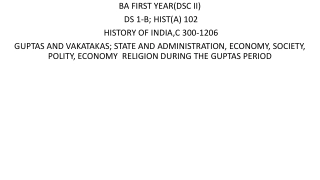
![READ⚡[PDF]✔ Emerging Space Powers: The New Space Programs of Asia, the Middle Ea](/thumb/21554/read-pdf-emerging-space-powers-the-new-space-programs-of-asia-the-middle-ea.jpg)

